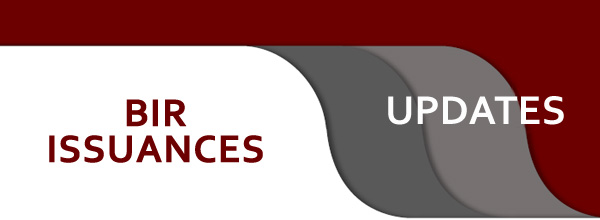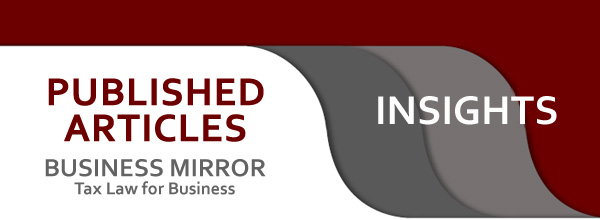

FEBRUARY • VOL. 2 • SERIES OF 2024
INSIGHTS is a monthly publication of BDB LAW to inform, update and provide perspectives to our clients and readers on significant tax-related court decisions and regulatory issuances (includes BIR, SEC, BSP, and various government agencies).

DISCLAIMER: The contents of this Insights are summaries of selected issuances from various government agencies, Court decisions, and articles written by our experts. They are intended for guidance only and as such should not be regarded as a substitute for professional advice.
Copyright © 2024 by Du-Baladad and Associates (BDB Law). All rights reserved. No part of this issue covered by this copyright may be produced and/or used in any form or by any means – graphic, electronic, and mechanical without the written permission of the publisher.
What's Inside ...
- HIGHLIGHTS FOR JANUARY 2024
- SIGNIFICANT COURT DECISIONS
- Supreme Court
- Court of Tax Appeals
- SIGNIFICANT REGULATORY ISSUANCES
- Bureau of Internal Revenue
- Securities and Exchange Commission
- PUBLISHED ARTICLE
- Compliance With VAT Obligations: Are We Expecting Changes?
- OUR EXPERTS
- The Personalities
- The Personalities


HIGHLIGHTS for JANUARY 2024
SUPREME COURT DECISIONS
-
The authority to resolve administrative dispute or a dispute involving two agencies of the Executive Branch of government is vested upon the President of the Philippines. (The Department of Energy v. Commissioner of Internal Revenue, G.R. No. 260912, August 30, 2023)
COURT OF TAX APPEALS DECISIONS
-
Statement of accounts (“SOA”) cannot be treated as notice of assessment for purposes of applying Section 195 of the LGC of 1991. (Light Rail Manila Corp. v. Daza, C.T.A. AC No. 267, January 4, 2024)
-
BIR regulations additionally requiring an approved prior application for effective zero rating cannot prevail over the clear VAT nature of respondent's transactions. (Air Drilling Associates Pte. Ltd. v. Commissioner of Internal Revenue, C.T.A. Case No. 10399, January 4, 2024)
-
Failure to submit relevant supporting documents will not automatically result in the assessment becoming final, executory, and demandable. (Commissioner of Internal Revenue v. 8196 Convenience Corp., C.T.A. EB Case No. 2648 (C.T.A. Case No. 9818), January 5, 2024)
- A collection effort must be initiated by court proceedings or by distraint or levy thru the issuance of a warrant of distraint and/or levy. (Canlubang Waterworks Corp. v. Commissioner of Internal Revenue, CTA Case No. 10682, January 10, 2024)
-
FRIA clearly provides that the waiver of taxes granted to a distressed corporation is only until the approval of a Rehabilitation Plan or dismissal of the Petition, whichever comes first. (Calfurn Mfg. Philippines, Inc. v. Quinsaat, C.T.A. AC No. 253, January 25, 2024)
BIR ISSUANCES
- Revenue Regulations No. 01-2024 – This amends Section 2, Subsection 4.109-1(B)(p) of Revenue Regulations No. 08-2021, to implement the adjustment of the selling price threshold of the sale of house and lot, and other residential dwellings for value-added tax exemption purposes.
- Revenue Memorandum Circular No. 05-2024 – This clarifies the proper tax treatment of cross-border services in light of the Supreme Court En Banc Decision in Aces Philippines Cellular Satellite Corp. v. Commissioner of Internal Revenue, GR. No. 22668
- Revenue Memorandum Circular No. 08-2024 - This clarifies the provisions of Revenue Regulations No. 16-2023 imposing Withholding Tax on gross remittances made by electronic marketplace operators and digital financial services providers to sellers/merchants.
- Revenue Memorandum Circular No. 13-2024 - This clarifies the treatment of retirement benefits expense for financial reporting and tax purposes.
- Revenue Memorandum Circular No. 14-2024 - This ceases the payment of Annual Registration Fee pursuant to Republic Act No. 11976 (Ease of Paying Taxes Act).

The authority to resolve administrative dispute or a dispute involving two agencies of
the Executive Branch of government is vested upon the President of the Philippines.
The BIR issued a tax assessment against the Department of Energy (DOE). The DOE, on the other hand, failed to file a protest letter to the BIR’s Final Assessment Notice (FAN) making the assessment final, executory and demandable.
As a consequence, the BIR issued a Warrant of Distraint and/or Levy and Gamishment against the DOE. There being no other recourse, the DOE filed a Petition for Review before the CTA.
The CTA dismissed DOE’s Petition for lack of jurisdiction on the ground that the case involves purely intra-governmental dispute. Thus, it should have been appealed to the President of the Philippines.
The SC affirmed the decision of the CTA.
According to the SC, Republic Act No. 1125, as amended, is the general law governing the appellate jurisdiction of the CTA, which include resolving disputed assessments, that apply equally to all persons involving disputes pertaining to all tax claims arising from all tax laws being implemented by the BIR. On the other hand, Presidential Decree (P.D.) No. 242 is the special law governing all disputes exclusively between government agencies, offices and instrumentalities, arising from the interpretation and application of statutes.
Being an administrative dispute or a dispute involving two agencies of the Executive Branch of government, the authority to resolve the same vested by P.D. No. 242 upon the President of the Philippines governs. (The Department of Energy v. Commissioner of Internal Revenue, G.R. No. 260912, August 30, 2023)

Statement of accounts (“SOA”) cannot be treated as notice of assessment for purposes of applying Section 195 of the LGC of 1991
During the renewal of the taxpayer’s business permits and licenses, the City Treasurer of Manila issued statement of accounts (“SOA”) indicating the computation of LBT that needs to be paid.
The taxpayer then paid under protest the LBT with prayer for refund. Since there was no action by the City Treasurer, the taxpayer filed a judicial claim for refund before the Regional Trial Court (“RTC”). The RTC however dismissed the case for being filed out of time.
Not agreeing with the decision of the RTC, the taxpayer appealed to the CTA and argued that the SOAs cannot be considered as Notice of Assessment. As such, the period under Section 196 of the LGC should apply instead of Section 195.
The CTA ruled in favor of the taxpayer. Section 195 of the LGC is clear that a Notice of Assessment (“NOA”) shall be issued by the local treasurer or his duly authorized representative when there is a finding that correct taxes, fees, or charges have not been paid by the taxpayer. The NOA should state the nature of the tax, fee, or charge, the amount of deficiency, the surcharges, interests, and penalties.
In the case at bar, the subject SOAs failed to comply with the requirements of a NOA under Section 195 of the LGC of 1991. The SOAs do not state the factual and legal bases of the tax, fee, or charge as well as the amount of deficiency, surcharges, interests and penalties. While the SOAs reflect various line items with corresponding amounts (e.g.,"x x x COMMON CARRIER," "Garbage Fee," "R E SUB LESSOR"), there are columns without titles or headers to indicate what the amounts stated therein represent. It is only in the official receipts that the particulars, the amount of taxes and fees, surcharge/interest were reflected and became known to the taxpayer. Although the SOAs state that, "This Statement is valid until 1/31/2020," it cannot be considered as the due date for payment. For having failed to comply with the law, the subject SOAs cannot be deemed as NOAs in this case.
Considering the absence of NOA in the instant case, this Court finds that Section 196 of the LGC of 1991 applies instead. (Light Rail Manila Corp. v. Daza, CTA. AC No. 267, January 4, 2024)
BIR regulations additionally requiring an approved prior application for effective zero rating cannot prevail over the clear VAT nature of the taxpayer's transactions.
This is a claim for refund of unutilized input VAT credits attributable to the taxpayer’s zero-rated sales, including services rendered to a company engaged in renewable energy. The BIR claims that the refund claim must be denied by reason of, amongst others, taxpayer’s failure to file an Application for Zero-Rating on its effectively zero-rated transactions.
The CTA ruled in favor of the taxpayer. The BIR regulations additionally requiring an approved prior application for effective zero-rating is not within the statutory authority granted by the legislature.
No prior approved application is required for a transaction to be treated as subject to the 0% VAT rate. As such, denying the taxpayer’s claim for a refund of the input VAT for the latter's failure to file the approved application for zero-rating on its effectively zero-rated transactions cannot be sustained. (Air Drilling Associates Pte. Ltd. v. Commissioner of Internal Revenue, CTA Case No. 10399, January 4, 2024)
Failure to submit relevant supporting documents will not automatically result in the assessment becoming final, executory, and demandable.
This is an assessment issued by the BIR against the taxpayer for alleged deficiency in internal revenue taxes.
During the hearing in the CTA Division, the court denied the CIR’s argument that the assessment had become final and demandable due to the taxpayer’s failure to submit all relevant supporting documents within the sixty (60) day period from the filing of the protest. Not agreeing with the decision of the CTA Division, the CIR appealed to the CTA En Banc.
The CTA En Banc ruled in favor of the taxpayer. The failure of the taxpayer to submit the relevant supporting documents to support its protest should not automatically render the assessment final, executory, and demandable. The BIR cannot demand what type of supporting documents should be submitted. Otherwise, a taxpayer will be at the BIR’s mercy, which may require the production of documents that a taxpayer cannot submit. Differently put, taxpayer will be at the BIR’s mercy and the period within which they can elevate their case to the CTA will never run, to their extreme prejudice.
A taxpayer’s failure to submit the relevant supporting documents within the reglementary period would only render the assessment against it final, as opposed to being not only final but also executory and demandable.
Under Revenue Regulations No. 18-2013, the phrase "the assessment shall become final" shall mean that the taxpayer is barred from disputing the correctness of the issued assessment by the introduction of newly discovered or additional evidence, and the FDDA shall consequently be denied. In other words, the failure to submit relevant supporting documents will not automatically result in the assessment becoming final, executory, and demandable. The immediate consequence of such failure is that the protest will be denied and the issuance of the FDDA shall subsequently follow. The FDDA, however, may still be appealed to the CIR by way of a request for reconsideration, or to the CTA by way of a petition for review. (Commissioner of Internal Revenue v. 8196 Convenience Corp., CTA EB No. 2648 (CTA Case No. 9818), January 5, 2024)
A collection effort must be initiated by court proceedings or by distraint or levy thru the issuance of a warrant of distraint and/or levy.
This is an assessment issued by the BIR against the taxpayer for alleged deficiency internal revenue taxes for taxable year 1999. In 2002, the BIR issued an FLD against the taxpayer which was followed up with 2 informal collection notice in November 2003 and January 2004. The BIR subsequently issued a warrant of garnishment on March 2008.
The taxpayer filed its Petition before the CTA and argued that the CIR’s issuance of the two collection notices is not considered as an act of collection. Hence, the right of the BIR to collect within 3 years from issuance of the FAN has prescribed.
The tax court ruled in favor of the taxpayer and held that it cannot accept the BIR’s contention that the collection efforts began upon the issuance of his collection notice. Nothing in the letter implies the initiation of collection efforts via distraint or levy. It is at most a reiteration of the BIR’s demand for payment. Instead, the earliest issuance that can be considered to have validly initiated any collection effort was the Warrant of Garnishment issued in March 2008.
According to the court, collection effort must be initiated by court proceedings or, more relevant to the case bar, by distraint or levy. And distraint or levy are "validly begun" through the issuance of a WDL.
Thus, the Warrant of Garnishment is the earliest valid collection effort initiated. But the same was issued 1,981 days after the issuance of the FLD. This is well beyond the 3 year period that is given to the BIR to collect. (Canlubang Waterworks Corp. v. Commissioner of Internal Revenue, CTA Case No. 10682, January 10, 2024)
Under RMC No. 17-2018, the Regional Director is the person authorized to sign the denial letter for VAT refund cases.
The taxpayer received a Letter ("Denial Letter") signed by the Revenue District Officer (“RDO”) stating that its claim for refund was denied for non-compliance with the requirements enumerated in its Notice to Comply letter.
The CTA ruled that the RDO has no authority to sign the denial letter for VAT refund cases. Under RMC No. 17-2018, the Regional Director, not the RDO, should sign the denial letter. While claims for VAT refund are filed with the concerned RDO, the role of an RDO is limited only to the verification and processing of the claims.
Considering that the RDO is not authorized to sign the denial letter and there is no proof that the taxpayer has received the Regional Director's Denial Letter, the CTA deems that there is no decision rendered on the taxpayer's application for refund or tax credit where it can derive its jurisdiction upon appeal.
Nonetheless, the CTA ruled that it has acquired jurisdiction due to BIR's inaction, having received no "decision" after the lapse of the 90-day period. (Halliburton Worldwide Limited-Philippine Branch v. Commissioner of Internal Revenue, C.T.A. Case No. 10139, July 26, 2023)
FRIA clearly provides that the waiver of taxes granted to a distressed corporation is only until the approval of a Rehabilitation Plan or dismissal of the Petition, whichever comes first
The taxpayer filed a Petition for Corporate Rehabilitation. It argued before the Rehab Court that its Real Property Tax (RPT) and Local Business Tax (LBT) assessments for taxable years 2009 to 2022 should be waived in light of the provisions of Section 19 of the Financial Rehabilitation and Insolvency Act ("FRIA") Law of 2010.
The BIR argued that the waiver of taxes immediately ends upon the approval of the Rehabilitation Plan or dismissal of the Petition, whichever comes earlier.
The Rehab Court denied the taxpayer’s waiver request in its entirety.
The CTA, however, partially granted the Petition only insofar as taxes for the period of December 17, 2008 (date of issuance of Commencement Order) to December 16, 2009 (date of approval of the Rehabilitation Plan) are concerned, which taxes are deemed waived by express provision of Section 19 of Republic Act No. 10472.
It should be noted that the waiver of national and local taxes provided for under Section 19 of the FRIA is akin to a tax exemption. Well-settled is the rule that a tax exemption is strictly construed against the taxpayer because an exemption restricts the collection of taxes necessary for the existence of the government.
Thus, the waiver of taxes in Section 19 of the FRIA can only be claimed within the specific parameters provided therein, specifically only from the date of issuance of the Commencement Order until the approval of the Rehabilitation Plan or dismissal of the Petition, whichever comes first. (Calfurn Mfg. Philippines, Inc. v. Quinsaat, C.T.A. AC No. 253 , January 25, 2024)


Revenue Regulations No. 01-2024 -
This amends Section 2, Subsection 4.109-1(B)(p) of Revenue Regulations No. 08-2021, to implement the adjustment of the selling price threshold of the sale of house and lot, and other residential dwellings for value-added tax exemption purposes
Revenue Memorandum Circular No. 05-2024 -
This clarifies the proper tax treatment of cross-border services in light of the Supreme Court En Banc Decision in Aces Philippines Cellular Satellite Corp. v. Commissioner of Internal Revenue, GR. No. 22668
Revenue Memorandum Circular No. 07-2024 -
This reverses the Value-Added Tax exemption of transactions specified under Section 109 (BB) of the National Internal Revenue Code (Tax Code) of 1997, as amended
The following transactions under Section 109 (BB) of the Tax Code of 1997, as amended, shall no longer be exempt from value-added taxes (VAT) effective January 1, 2024, to wit:
Sale or importation of the following:
(i) Capital equipment, its spare parts, and raw materials, necessary for the production of personal protective equipment components such as coveralls, gown, surgical cap, surgical mask, N-95 mask, scrub suits, goggles and face shield, double or surgical gloves, dedicated shoes, and shoe covers, for COVID-19 prevention; and
(ii) All drugs, vaccines, and medical devices specifically prescribed and directly used for the treatment of COVID-19; and (iii) Drugs for the treatment of COVID-19 approved by the Food and Drug Administration (FDA) for use in clinical trials, including raw materials directly necessary for the production of such drugs.
Thus, the above transactions shall now be subject to VAT starting January 1, 2024.
Revenue Memorandum Circular No. 08-2024 -
This clarifies the provisions of Revenue Regulations No. 16-2023 imposing Withholding Tax on gross remittances made by electronic marketplace operators and digital financial services providers to sellers/merchants
Revenue Memorandum Circular No. 08-2024 - This clarifies surcharge computed in the filing of an amended return in the electronic Filing and Payment System (eFPS)
Revenue Memorandum Circular No. 11-2024 -
This treatment of lease accounting by lessees under Philippine Financial Reporting Standard 16 in relation to Sections 34(A), 34(K), 106, 108, 179, 194 of the Tax-code, as amended, RR No. 19-86, as amended, and RR No. 02-98, as amended
While the eFPS is being enhanced to adjust the computation of the surcharge, eFPS users/taxpayers are advised to disregard the surcharge computed by the system when filing an AMENDED tax return. If there is an additional tax to be paid as a result of such amendment, pay only the basic tax, the computed interest and the compromise, provided, that the original tax return was filed on or before the set deadline.
The following is the overview of the Philippine Financial Reporting Standards (PFRS) and tax treatment relative to leases:
|
Particulars |
PFRS |
Taxation |
||
|
General Approach |
Lease Exemption |
Lease |
Conditional Sale |
|
|
Depreciation of Right-of-Use Asset (ROUA) |
Generally recognized as expense |
Not recognized |
Not allowed as deduction |
Depreciation of leased asset can be claimed as deduction from gross income |
|
Interest on lease liability |
Generally recognized as expense |
Not recognized |
Not allowed as deduction |
Interest on lease liability can be claimed as deduction from gross income |
| Rent expense | Generally recognized as expense | Recognized on a straight - line basis over the long term | Allowed as deduction from the gross income | Not recognized |
| Gain/loss on lease modification | Recognized in profit or loss at the time of modification | Not recognized but may affect the amount of rent expense to be recognized in subsequent period/s | Not included in the determination of taxable income | Does not apply to leases that qualify as conditional sale |
This RMC also provided detailed discussions on specific tax implications relative to business tax, withholding tax and documentary stamp tax (DST) related to leases.
Revenue Memorandum Circular No. 12-2024 -
This clarifies the treatment of foreign currency transactions for financial reporting and internal revenue tax purposes
The following is the overview of the Philippine Financial Reporting Standards (PFRS) and tax treatment relative to foreign currency transactions:
|
Particulars |
PFRS |
Tax Treatment |
|
Initial measurement of foreign currency transactions |
Recorded in the entity’s functional currency using the spot rate of exchange at transaction date |
Translated into Philippine Peso using the prevailing interbank reference rate on the date of transaction |
|
Unrealized gain or loss on remeasurement of monetary assets and liabilities denominated in foreign currency |
Recognized in profit or loss |
Results to a temporary difference and deferred tax accounting to reconcile accounting net income to taxable net income |
|
Unrealized gain or loss on remeasurement of non-monetary items carried at fair value currency transaction |
Recognized in profit or loss or other comprehensive income depending on the treatment of the changes in the fair value of the item itself |
Not considered in the determination of the taxable income |
|
Realized gain or loss on settlement of a foreign currency transaction |
Recognized in profit or loss |
Forex gains/losses arising from closed and completed transactions are considered as taxable income or deductible expense for income tax purposes |
This RMC also tackles common issues, including guidelines, relative to the tax treatment of foreign currency transactions.
Revenue Memorandum Circular No. 13-2024 -
This clarifies the treatment of retirement benefits expense for financial reporting and tax purposes
The following is the overview of the Philippine Financial Reporting Standards (PFRS) and tax treatment relative to employee retirement benefits expense:
|
Particulars |
PFRS |
Tax Treatment |
|
|
R.A. No. 4917 |
R.A. 7641 |
||
|
Employee benefit expense |
Employee benefit expense comprise of:
|
Contribution to a tax qualified plan is deductible expense |
Actual retirement benefits paid is a deductible expense |
|
Current service cost |
Recognized in profit or loss as part of employee benefit expense |
Contribution for normal cost is deductible in full |
Not applicable |
|
Past service cost |
Recognized in profit or loss as part of employee benefit expense |
Contribution for past service liability is recognized as deductible expense over ten years |
Not applicable |
|
Gain or loss on settlement |
Recognized in profit or loss as part of employee benefit expense |
Not applicable |
|
|
Return on plan assets |
Included in the employee benefit costs |
Exempt from income tax |
Not applicable |
| Remeasurement gains and losses | Remeasurement gains and losses are recognized in other comprehensive income | Not applicable | |
| Actuarial valuation method | Actuarial valuation for accounting | Actuarial valuation for funding | Not applicable |
This RMC also tackles common issues relative to the tax treatment of employee retirement benefit expense.
Revenue Memorandum Circular No. 14-2024 -
This ceases the payment of Annual Registration Fee pursuant to Republic Act No. 11976 (Ease of Paying Taxes Act)
This Circular is issued to advise all business taxpayers that effective January 22, 2024, the Bureau of Internal Revenue (BIR) will cease collecting the Annual Registration Fee (ARF) from business taxpayers in compliance with Republic Act No. 11976, otherwise known as the "Ease of Paying Taxes Act."
Revenue Memorandum Circular No. 15-2024 -
This prescribes the temporary use of BIR Form No. 0605 for the Remittance of Creditable Withholding Tax by Joint Ventures/Consortiums under Revenue Regulations No. 14-2023
Revenue Memorandum Circular No. 16-2024 -
This extends the deadline for the submission of alphabetical list of employees/payees from whom taxes were withheld
The deadline of submission of the alphalist for the taxable year 2023 using the new version of the Alphalist Data Entry and Validation Module is hereby extended up to February 28, 2024.
A separate tax advisory shall be posted on the BIR’s website informing the availability of the updated version of the said module.
Revenue Memorandum Circular No. 17-2024 -
This publishes the November 29, 2023 letter from the Food and Drug Administration of the DOH endorsing updates to the List of VAT-Exempt Medicines under RA No. 10963 (TRAIN Law) and RA No. 11534 (CREATE Act)


The Ease of Paying Taxes Act, In A Nutshell
By Atty. Rodel C. Unciano
Let me highlight some of the significant changes in our tax rules pursuant to the recently enacted law, Republic Act No. 11976 or the Ease of Paying Taxes Act (EOPT).
For value-added tax (VAT) compliance, one significant amendment is the uniform use of VAT invoice for both sale, barter, exchange, or lease of goods or properties, and for every sale, barter or exchange of services. So, for VAT compliance and for the purpose of claiming input tax credit, only VAT invoice is the acceptable proof to substantiate the claim for input tax credit, whether it is a purchase of goods or purchase of services.
On the deductibility of expenses for the purpose of determining taxable income, withholding of taxes is no longer a requirement for the deductibility of income payments. As you know, under the current rules, income payments are allowed as deduction only if it is shown that the appropriate withholding tax has already been withheld by the income payor. Very often, in tax investigation cases, taxpayers under investigation are sometimes left without option but to pay the withholding tax in question just to be able to get the benefit of deductibility of the corresponding income payments under question.
On the refund of excess input tax, EOPT already made clear that in case of failure on the part of the Commissioner to act on the taxpayer’s application within the ninety (90)-day period from filing of the application, the taxpayer affected may already appeal the Commissioner’s inaction with the Court of Tax Appeals (CTA).
On the refund of taxes erroneously or illegally collected, claims for refund shall be decided by the Commissioner within one hundred eighty (180) days from the date of submission of complete documents in support of the application filed. In case of the failure on the part of the Commissioner to act on the application for refund within the one hundred eighty (180)-day period, the affected taxpayer may already appeal the inaction with the CTA.
To recall, the issue on the non-exhaustion of administrative remedies has been a source of dispute in some refund cases brought before the CTA as some claimants would file claims for refund before the CTA shortly after filing the administrative claim with the Bureau of Internal Revenue (BIR). Apparently, with this amendment, in case the Commissioner does not act on the claim for refund, the claimant-taxpayer can no longer appeal its claim for refund with the CTA without waiting for the expiry of the one hundred eighty (180)-day period for the Commissioner to act on the claim for refund.
On the registration and de-registration compliance with the BIR, cancellation of registration may now be effected by mere filing of a prescribed form for an application for registration information update with the BIR Revenue District Office (RDO) where the taxpayer is registered, and this may be done electronically or manually. This shall not, however, preclude the Commissioner from conducting an audit to determine the taxpayer’s liability, if any. And in case a registered person decides to transfer its place of business, this may also be effected by mere filing, either electronically or manually, an application for information update.
Under the current rules, transferring of registration has become too burdensome to transferring taxpayers, especially in cases where the taxpayer has pending tax investigation cases in the RDO where it is registered. Taxpayer’s pending tax investigation cases used to be a cause of delay in the taxpayer’s attempt to transfer its BIR registration to another RDO. With the amendments introduced by EOPT, taxpayers may now easily transfer to another RDO even in cases where the taxpayer has ongoing tax investigation cases. But if the transferring taxpayer is subject of an audit investigation, the RDO which initiated the audit investigation shall continue the investigation.
On filing of returns and payment of taxes, these may already be done manually or electronically to any RDO, authorized agent bank, or software provider. So, this means that taxpayers may now file tax returns and make the necessary tax payments in any accredited payment channels in any BIR RDO other than the RDO where they are registered.
Finally, let me highlight that while the focus of the EOPT is for ease of paying taxes for the benefit of taxpayers and for ease of tax administration, the law also introduced some minor changes on the imposition of civil penalties and interest depending upon the taxpayer’s classification.
Under the law, taxpayers are now classified into micro, small, medium and large taxpayers, depending upon the taxpayer’s gross sales. And for micro and small enterprises, EOPT has granted them special concessions including a reduced rate of ten percent (10%) for civil penalties under Section 248 of the Tax Code and a fifty percent (50%) reduction on the interest rate imposed under Section 249 of the Tax Code, among others.
The Department of Finance is yet to issue the Implementing Rules and Regulations, and hopefully, it will be able to fill in the details necessary for the successful implementation of the law and consistent with the objective set to be achieved, which is embodied in the title of the law itself, ease of paying taxes.
----------------------------------------------
For inquiries on the article, you may call or email
ATTY. RODEL C. UNCIANO
Partner
T: +63 2 8403 2001 loc. 380
This email address is being protected from spambots. You need JavaScript enabled to view it.



DISCLAIMER: The contents of this Insights are summaries of selected issuances from various government agencies, Court decisions and articles written by our experts. They are intended for guidance only and as such should not be regarded as a substitute for professional advice.
Copyright © 2023 by Du-Baladad and Associates (BDB Law). All rights reserved. No part of this issue covered by this copyright may be produced and/or used in any form or by any means – graphic, electronic and mechanical without the written permission of the publisher.






